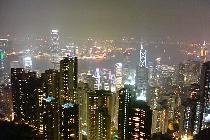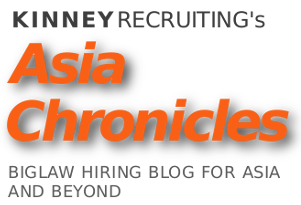A great draw of US biglaw associates to Hong Kong is the lucrative and somewhat illogical expat / cola allowances. Even though the cost of living in Hong Kong is not much different than New York (housing is a bit higher in HK), it is common to receive an expat / cola allowance of well over $60,000 USD.
Last year most in the Hong Kong market expected the lucrative US associate expat / cola allowances to lower  dramatically, due to the global recession (which did greatly reduce deal flow in HK / China from late ’08 to mid ’09) and with many firms on global hiring freeze at the time. However, in reality, the expat / cola allowances at the more competitive US and UK firms in HK were never really in danger of dropping much, even during the very slow lateral biglaw hiring period in HK from December ’08 until October ’09.
dramatically, due to the global recession (which did greatly reduce deal flow in HK / China from late ’08 to mid ’09) and with many firms on global hiring freeze at the time. However, in reality, the expat / cola allowances at the more competitive US and UK firms in HK were never really in danger of dropping much, even during the very slow lateral biglaw hiring period in HK from December ’08 until October ’09.
Actually, when it comes to expat / cola at major US and UK firms in HK, there are two groups:
Competitive: the majority of the top 20 US and UK magic circle firms, and a minority of lower ranked firms, pay expat / cola somewhere in a range of $60,000 to $90,000 (for singles with no children; some of these firms give much higher expat / cola to associates with kids, especially school-aged), with the majority of those in mid 60’s and only a handful at $80,000 or above. These firms all have set in stone non-negotiable expat / cola allowances for each US associate and it is the same allowance at all associate seniority levels.
Less than Competitive: the minority of top 20 US and UK magic circle firms, and the majority of lesser ranked firms, pay expat / cola in a range between zero and $55,000, with the majority of these firms in 30s and 40s. Unlike the Competitive group, the majority of these firms allow for expat / cola to be negotiated, on case-by-case basis, for each new hire (of course, most offerees do not realize that negotiation is possible), causing there to be at these firms different US associate comp packages at same levels. A large minority of these firms do have a set US associate expat / cola allowance, so that each associate receives same, so when a new hire negotiates for higher expat / cola, it effects the US associates already at the firm. A small minority of these firms have two or more different expat / cola packages, depending on the seniority of the US associate. A common theme among the less than competitive group is that expat / cola can fluctuate up and down a lot, depending on the actual market and perceptions of the market (sometimes perceptions of expat / cola in the market can be way off the mark, as happened at many of these firms in ’09 and early ’10, as US associate hiring started rising again in HK).
In mid ’08 (just before hiring and deal flow fell dramatically for some time in HK biglaw) expat / cola in HK at the competitive top US and UK firms ranged from $60,000 to $80,000. Today the range in the competitive group is $60,000 to $90,000, with no movement at the vast majority of those firms. Every HK firm paying expat / cola in the $60,000+ range in ’08 continues to do so today and not one of these firms even temporarily dropped below $60,000 at any point in since the global recession hit. In fact, only four firms had any movement at all (one firm moved from 65k to 90k, one lowered from 80k to 65k and then returned to 80k, one lowered from 80k to 65k, and one firm lowered from 79k to 65k).
The lesser competitive major US and UK firms in HK had expat / cola ranging from zero to $55,000 in mid ’08 and today most of those firms are offering about the same that they did before. However, a number of these firms substantially lowered their expat / cola allowances temporarily in ’09 and early ’10, but now have returned to previous mid ’08 levels. Some of these firms seriously considered stepping up to $60,000 plus group in early to summer ’08, before the IPO shutdown in China hit that fall, and now are again considering to do so. Two already have made the jump up.
During the recent global recession and still downturn in biglaw work globally, Asia markets have obviously fared much better than the West, and that includes biglaw deal flow per US attorney in the market. In HK / China, things have been sizzling, especially concerning IPOs since last summer. A major drop off in deal flow in HK / China occurred from late November ’08 until around May ’09, but in the key practice area for most US and UK firms in HK, cap markets, things have been booming since ’09.
During the rebound of work in Asia, especially in HK / China, US corporate practices had staffing problems, but not because of there not being a large number of outstanding US associate candidates available on the market from late ’08 through ’09 (it was quite the contrary, with sometimes more than ten stellar candidates for one opening, the type of candidate that would have multiple offers in two weeks if on the market in ’07 in HK), but because even understaffed groups were typically not given the green light by firm management to make hires. As we all know, most firms were on either a strict hiring freeze, or at least a quasi-hiring freeze in the US, during ’08 and ’09 and that freeze extended to even the much busier offices in Asia.
However, the little biglaw hiring that was being done in Asia from late ’08 through ’09 was highly competitive. Firms that were able to hire (mostly top 15 US firms and UK magic circle firms) wanted to only consider the very best candidates on the market. These firms doing most of the little hiring in ’09 in Asia (mostly in HK / China) had some of the highest expat packages and were competing for the top candidates coming from top 5 NYC firms and who expected those expat packages to continue. Further, these firms, already understaffed in some cases (mostly, cap markets groups in HK / China), could not afford to lose their own US associates, which at least in theory (with hiring freezes in place at many top firms, not likely) could have happened if expat packages were dropped, while still being available at peer competitor firms. At the very least, US associates at top US practices in HK would have not been happy if their expat / cola fell and would have taken note that same did not happen at peer firms during the slow hiring time, but during an IPO boom, a time when many US associates in HK were busier than ever and in understaffed groups.
While there was little change in expat allowances among the competitive group in HK, many among the less competitive group dramatically lowered theirs, in many cases erroneously assuming that the top of the market were dramatically lowering theirs. Some of these are highly ranked US and UK firms.
On numerous occasions throughout ’09 and very early ‘10, I had a similar conversation with a partner at one of the less competitive firms that wanted to hire one of my US associate candidate clients, but was convinced that high expat / cola was a thing of the past in HK, due to the global recession. I would give them the current numbers at the time with regards to expat / cola at top firms in HK and they were usually in disbelief and still fully expecting those numbers would drop dramatically soon. In most of these instances, the firm ended up being open to negotiation regarding the offeree’s expat / cola and significantly raised the number by the time the offer was accepted.
By early ’08, many of the lesser competitive top US and UK firms in HK had started to cave in to the need to offer high expat allowances in order to compete for talent. Back then, it was a necessity to be able to bring on board qualified US associates.
Today, there are at least 5 times as many qualified US associate candidates looking to move to HK, for each position available, than was the case in ’06, ’07 and ‘08. Thus, expat allowances are not at all necessary to fill US associate openings, but competitive allowances are a requirement to be able to attract the best talent on the market.
And that is what biglaw recruiting is always about at the vast majority of firms – to hire the best possible candidate who you are able to interview, relative to the market conditions at the time.
When the US associate lateral market in HK was booming from late ’06 to mid ‘08, the top US practices fought each other to be able to hire enough qualified associates to be adequately staffed. The leverage belonged to the candidates on the market. Now the number of openings is just about the same as in ’07 in HK, but the leverage is with the firms. There are just too many very qualified US associate candidates on the market, so firms are fighting each other to get the very best talent, the native fluent in Mandarin US associates who hail from cap markets and / or M&A practices of top 5 Wall St. firms, and who also happen to interview very well and have the right personality fit for a small and busy overseas office.
The point is that there is and always will be still a fierce competition among peer firms in HK for the very best talent available on the market and the top US associate talent available on the market will receive offers and will expect a competitive expat / cola allowance. While it is very rare that an associate candidate will choose one firm over another for less than a $20,000 difference in expat / cola, a larger difference will usually be influential in a decision.
I can’t foresee the expat / cola allowances in HK falling unless there were to be a catastrophic drop in deal flow in HK / China and the US markets at the same time. During the recent global recession, China was severely affected, but only for a fraction of the time that the US and other Western markets were affected and China’s rebound was rapid and a full boom. As long as the top US and UK firms in HK are competing for the best US associate candidates on the market, as well as fighting to keep their own talent from being poached away, it is not logical for expat / cola to fall. This is the case, even though expat / cola in HK is in many ways illogical, considering the true difference in cost of living between NYC and HK and the fact that many US associates get an enormous tax windfall in HK (many US associates are not US persons for tax purposes) and all get at least some significant tax advantages (even US persons for tax purposes are not subject to US tax on a large portion of their income in HK).
Related Posts:
- None Found
